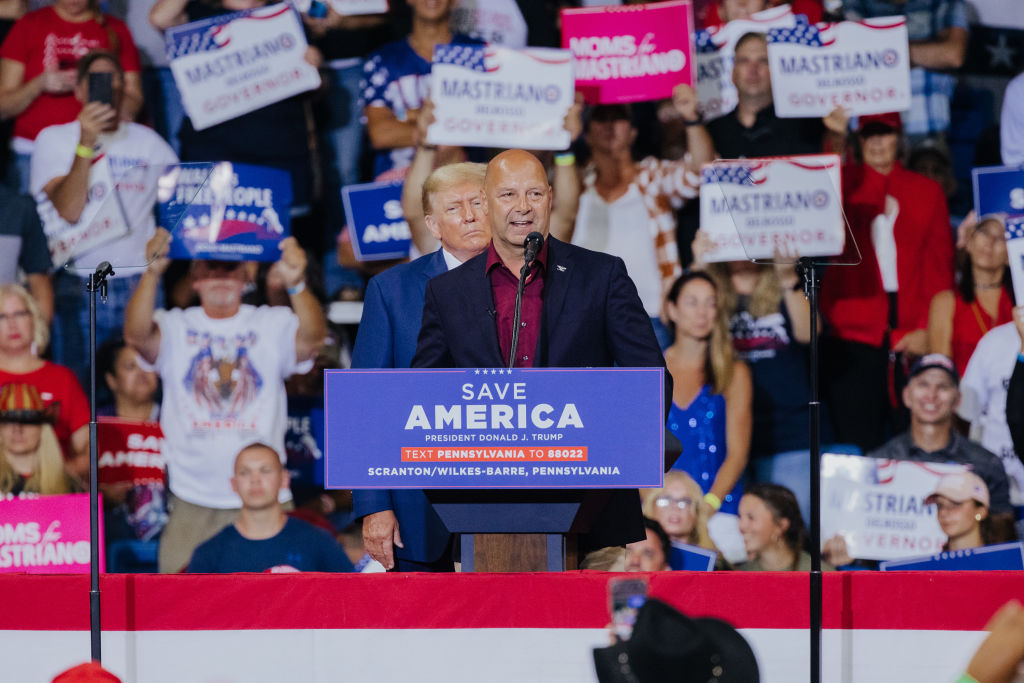
In a recent national poll, researchers found that a majority of Republicans favor declaring the United States a Christian nation. In July, Marjorie Taylor Greene made waves on social media when she claimed Republicans should proudly embrace Christian nationalism. Politicians like Pennsylvania gubernatorial candidate Doug Mastriano have increasingly used Christian nationalist rhetoric on the campaign trail, likely due to seeing how well it worked for Trump. It is clear more people are paying attention to and using the term; there were more tweets including “Christian nationalism” in July of 2022 than in all of 2021 combined.
But what is “Christian nationalism” and is it really worth the fuss?
Christian nationalism refers to an ideology that asserts all civic life in the U.S. should be organized according to a particularly conservative and ethnocentric expression of Christianity. Christian nationalism is more than theological or religious beliefs. It includes several cultural assumptions including:
Christian nationalism centers and privileges the white, Christian experience. It believes the founders of the U.S. were conservative, white Christian men intent on founding a country where they and others like them could lead and flourish. Now, many Americans believe Christianity played an important role in the founding period or that the founding fathers were religious in one way or another. No reputable historian disputes these claims.
However, Christian nationalism moves well beyond such observations. It views this particular expression of Christianity as the undisputed framework of the U.S. and wants all levels of the government to preserve that framework.
This means that Christian nationalism does not want a government for the people by the people. It wants a government for a particular people, by a particular people. Namely, politically and religiously conservative white American Christians.
Survey after survey show between 15-20 percent of Americans strongly embrace the tenets of Christian nationalism, while another one-third support it, albeit less fervently.
Perhaps now we can sense the danger Christian nationalism poses to the U.S. if it sees our country as primarily for the benefit of a small subset of the overall population. A burgeoning collection of recent social science research provides evidence of the threats Christian nationalism poses and here I will identify three.
Christian nationalism is anti-democratic
Christian nationalism is about power. Power in the “right” hands to ensure the U.S. fulfills its covenant with God. However, democracy demands we share power. This places Christian nationalism at odds with democracy.
Americans who embrace Christian nationalism want to ensure the country does not turn its back on God. So when the political winds turn against stances they see as endorsed by God, they must do all they can to stand for what they see as the ultimate good. Candidates like Mastriano are willing to set aside democracy itself, ignoring the results of fair and free elections, to fulfill their interpretations of God’s commands.
This is why in one recent study we find that Americans who embrace Christian nationalism are more likely to:
And the national poll showing a majority of Republicans favor declaring the United States a Christian nation referenced above? It found Republicans support this stance despite recognizing such a move would be unconstitutional.
The anti-democratic propensities of Christian nationalism preserves the unequal access to the political process enjoyed by white, natural-born, conservative Christian citizens. Moves to expand who can pull the levers of power imperils this access. Therefore, Christian nationalism will discard democracy, if necessary.
Christian nationalism perpetuates racism
Various recent books demonstrate how white Christianity in the U.S. was a key part of the creation and preservation of racial hierarchies. White Christian nationalism served as the ideological mortar that allowed for the walls of racial division and inequality to be built, brick by brick. Today it perpetuates these systems.
Recent research shows Christian nationalism obscures the origins of racial inequality by allowing some to consider the current state of affairs as “just the way things are” or attributing racial inequality to personal or individual shortcomings of Black Americans. In fact, for white Americans, Christian nationalism is linked to affirming whites are the real victims. Christian nationalism is also directly linked to blaming Black Americans when police use deadly force.
According to the ideology of Christian nationalism, the negative experiences of racial and ethnic minorities in our country are mere distractions bent on sowing division.
Christian nationalism approves of political violence
Comfort with violence is a natural byproduct of Christian nationalism’s obsession with power. At times, the only way to get people to do what they should—as God commanded—is with the use (or threat) of force.
Embracing Christian nationalism is a leading predictor of which Americans believe the riots at the Capitol on January 6th were justified and that violence is acceptable in advancing political goals. Christian nationalism is also closely linked to believing true American patriots may have to resort to physical violence in order to save the U.S. These findings suggest that to a subset of the American population, January 6th was no mere aberration.
The next time we hear anyone confidently declare “true Americans” and “faithful Christians” should embrace Christian nationalism, or that the outcomes of elections are battles of biblical proportions of good versus evil, we can remember how Christian nationalism is anti-democratic, perpetuates racism, and approves of political violence.
These three threats are especially concerning when a national poll shows a majority of one political party favors declaring the U.S. a Christian nation.
It is vital we identify and help others recognize the threats Christian nationalism poses if we want to move closer to a country that truly exemplifies liberty and justice for all.
More Must-Reads from TIME
- How Donald Trump Won
- The Best Inventions of 2024
- Why Sleep Is the Key to Living Longer
- Robert Zemeckis Just Wants to Move You
- How to Break 8 Toxic Communication Habits
- Nicola Coughlan Bet on Herself—And Won
- Why Vinegar Is So Good for You
- Meet TIME's Newest Class of Next Generation Leaders
Contact us at letters@time.com